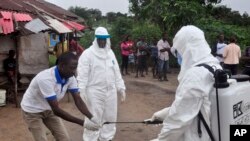Uganda’s ministry of health confirmed Thursday that one person has died of Marburg hemorrhagic fever, a close relative of the Ebola virus. Surveillance teams have deployed to the affected district in the eastern part of the country to contain the outbreak.
Uganda’s Ministry of Health says one of the two suspected cases of Marburg virus disease has been confirmed via laboratory tests conducted by the Uganda Virus Research Institute.
“The confirmed case was a 50-year-old female from Chemuron village, Kween District in Eastern Uganda. She presented with signs and symptoms suggestive of a viral hemorrhagic fever," said Dr. Jane Ruth Aceng, the minister for health. "Preliminary field investigations indicated that prior to her death, the deceased had nursed her 42-year-old brother, who had died on September 25, 2017 with similar signs and symptoms."
According to the World Health Organization, Marburg is transmitted via contact with the bodily fluids of an infected person or the handling of infected animals. Local media report that the deceased woman’s brother was a hunter.
The Ministry of Health has dispatched a rapid response team to the Kween district.
“As of this morning, because their surveillance obviously started from the hospitals where the confirmed case passed away, we have ten health workers who have been listed as contacts, and they have already been isolated in their homes for follow up,”Aceng said.
Uganda is no stranger to viral hemorrhagic fever. The country has battled several outbreaks of Ebola, including an outbreak in 2000 that killed over 200 people.
Marburg is named after the town in Germany where it was first identified in 1967, though that outbreak was traced back to infected monkeys brought from Uganda.
“We have the caves that have the bats that are capable of transferring infection to man in different parts of the country. You can never know when the next outbreak will be. It depends on when man interacts with an infected bat from one of these caves,” said Dr. Miriam Nanyunja , the disease prevention and control officer for the WHO in Uganda.
A person suffering from Marburg presents with sudden onset of high-level fever and headache. This can be accompanied by vomiting, joint and muscle pain, and unexplained bleeding.
There is no cure or vaccine available for Marburg. Patients are given supportive treatment to increase their chance of survival.




